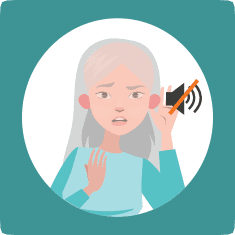HELP SENIORS PREVENT HEARING LOSS

An In-Depth Look at Senior Hearing Loss
Age-related hearing loss affects many seniors. Here’s how to help seniors prevent further hearing loss and cope healthily.
About 1 in 3 adults between 65 and 74 years old experiences hearing loss. Since hearing loss can sometimes be reduced, it’s important for seniors to be aware of their auditory health. (NIDCD)
Difficulty hearing or making out sounds can put seniors at risk of social, health, and safety problems. Here are the hearing loss basics. (NAIA)
The Basics of Hearing Loss
Who experiences hearing loss?
Anyone can experience hearing loss, but it is especially common among older adults. As age increases, the risk of hearing impairment increases as well.
What causes hearing loss?
Damage from noise or certain diseases can cause hearing loss, but so can the simple deterioration that comes with age. Deterioration can be exacerbated by medical conditions like high blood pressure, exposure to noise, and other factors.
Are there different levels of hearing loss?
Age-related hearing loss is often gradual. What may begin as simply needing the TV volume louder can turn into being unable to make out words or sounds.
How can hearing loss be prevented?
Currently, hearing loss can’t be prevented entirely. However, it can be minimized or delayed by protecting against noise and avoiding common conditions (like diabetes) that put you at greater risk of hearing loss.
Is hearing loss dangerous?
Medically, age-related hearing loss is unlikely to cause other health problems. However, being hard of hearing can put you in risky situations, such as making it difficult to hear an alarm or understand important instructions spoken to you. (NIDCD)
![]()
HELP SENIORS PREVENT HEARING LOSS
C A R E G I V E R S
Home Care Tip
There are some apps that can be paired with hearing aids to customize options and preferences. Encourage seniors to embrace technology like this to make using hearing aids less frustrating.
Risks Associated With Hearing Loss
Impaired hearing can make it hard for seniors to hear at all, but can also make understanding words clearly difficult. As a result, seniors are at greater risk for:
- Misunderstanding doctor’s instructions
- Mishearing warnings or important statements
- Not hearing fire alarms or other emergency notifications
- Growing isolated due to less confidence in conversations
- Certain health issues, particularly those related to stress or balance
(Hopkins Medicine)
Hearing Loss by the Numbers
- Among adults over 70 with hearing loss, only 1/3 of those who could benefit from hearing aids use them
- Around 28.8 million U.S. adults could use hearing aids for their benefit
- Men under 69 are twice as likely as women of the same age to experience hearing loss
- About 50% of people 75 or older have impaired hearing
(NIDCD)
What to Do If You Think You Have Hearing Loss
Signs of hearing loss include:
- Not being able to make sounds out against background noise
- Difficulty understanding words or sounds, especially consonants
- Withdrawal from conversations or avoidance of socializing
- Regularly turning up the volume
- Muffling of typically clear sounds including speech
If you have symptoms of hearing loss, see a doctor as soon as possible. A simple hearing test can lead to a diagnosis. Through the use of a hearing aid (or possibly with the help of surgery or implant), your hearing loss may be minimized.
(Mayo Clinic)
- Published in IN HOME CARE
TOP TIPS FOR TRAVELING WITH SENIORS
Top Tips for Traveling with Seniors
For seniors, travel can be especially challenging or risky. Use these tips to make senior travel fun and safe.
As adults age, their family members tend to act as long-distance caregivers. The average distance a long-distance caregiver lives from a senior is 450 miles. That means if seniors travel to see their loved ones, they often go a long way. (Caregiver.org)
It’s common for seniors to have some trouble getting around like they used to. So, it’s not surprising that long-distance travel can be a real challenge. Here’s how to make travel safer and more comfortable for aging adults.
Options for Travel for Seniors
Although seniors can travel by plane, train, or car, each option has pros and cons.
Traveling by Plane
Pros:
- A fast form of travel
- Can earn loyalty program points
- Often accommodates disabilities
Cons:
- Airports can be overwhelming
- Might be expensive
- Some are afraid of flying
Traveling by Train
Pros:
- Access to many locations
- Passes by moderately fast
- May allow for socializing
Cons:
- Routes can be inconvenient or confusing
- Limited options for stops and pricing
- Limited accessibility for those with disabilities
Traveling by Car
Pros:
- Control over routes/stops
- Can add cushions/supports for comfort
- Often most affordable
Cons:
- Can take a long time
- A possibility of getting lost
- Driving alone may not be safe
(AARP)
![]()
TOP TIPS FOR TRAVELING WITH SENIORS
C A R E G I V E R S – Tips for Traveling with Seniors
How Seniors Can Travel with Ease
For safe, comfortable, and fun travel experiences, seniors can use the following tips:
Prepare Ahead of Time
- Practice using a map app, write down directions
- Contact airports or train stations to learn about available assistance options
- Pack vital items in a carry-on or easily accessible bag in case of emergency or change of plans
- Research parking options (get a disability tag if necessary)
- Consult a doctor about plans if travel is a concern for medical reasons
- Know where medical facilities are located at travel destination
Ask Questions
Don’t be afraid to ask other people for help while traveling. Try to ask people who work wherever you are (in a hotel, airport, etc) for safety reasons. Never offer strangers more details than necessary when asking for help.
Bring Someone / Share With Loved Ones
- Find a friend or relative to travel with
- Inquire about traveling caregivers if assistance will be needed
- Share your location on your phone, as well as copies of your itinerary, with loved ones
(Better Health Channel)
A Senior’s “Bonus” Packing List
Although some of these items may be on most adults’ packing lists, they tend to be extra important for seniors to ensure their safety and comfort:
- Medications/supplements
- Support pillows or cushions
- Ambulatory/medical devices
- Hearing aid batteries
- Doctor list/medical alert information
- Compression socks
- Dentures holder/cleaner
(USA Today)
Why Most Seniors Travel
- See family/friends
- Multigenerational vacations
- Medical specialist appointments
- Complete “bucket list” goals
- Hosted or group tourist outings
(Senior Living)
Home Care Tip
Seniors may have difficulty estimating their need for downtime or rest while traveling. Encourage them to make plans that can be flexible so they can enjoy their time away.
References:
- Published in IN HOME CARE
UNDERSTAND CHOLESTEROL AND ITS EFFECTS ON IN HOME SENIORS CARE
Helping Seniors Maintain Healthy Cholesterol Levels
Cholesterol levels can be a source of stress for seniors. Here’s what seniors and their loved ones need to know.

Image extracted from 0319-Cholesterol-CMYK.pdf: 0319-Cholesterol-CMYK-page1-header.jpg
About 37 percent of U.S. adults have a higher than recommended LDL cholesterol level. Since this can increase risk of heart disease or stroke — and since seniors are already at higher risk of such health problems — it’s important for aging individuals to understand cholesterol. (Source: CDC)
What Cholesterol Is All About
Although many people think of cholesterol as something negative to avoid, cholesterol is actually a natural substance the body makes on its own. It helps cells make hormones, digest food, and more. Besides the cholesterol your body makes, you can also consume cholesterol in eggs, meat, and other foods.
There are three types of cholesterol doctors measure:
- High Density Lipoprotein (HDL)
- Low Density Lipoprotein (LDL)
- Triglycerides
HDL is considered “good” cholesterol because its function is to clear out LDL (“bad”) cholesterol, which can build up plaque in the arteries. Triglycerides can also accumulate and affect the heart. When doctors give patients their “cholesterol level,” higher HDL numbers are good news; higher LDL and/or triglyceride numbers are commonly referred to as “high cholesterol” and increase the risk of heart disease. (Source: MedlinePlus)
![]()
![]()
C A R E G I V E R S
Maintaining Healthy Cholesterol Levels
How to Manage Cholesterol Levels
Seniors tend to be at an elevated risk of heart disease simply because of the aging process. When a senior also has high cholesterol, their heart disease risk increases. It is important for seniors to manage their cholesterol levels in order to keep arteries clear and functional.
Here’s how cholesterol can be managed:
- Medication: There are a few medications that help lower bad cholesterol levels and increase HDL. The most common medications are called statins.
- Dietary Changes: Since cholesterol levels can be affected by what you eat, seniors with high LDL or triglycerides should:
- Avoid unhealthy fats
- Eat healthier fats
- Get plenty of fiber
- Reduce sugar intake
- Reach a healthy weight
- Exercise Regularly: The body can manage conditions like high cholesterol better if you are physically active. Exercise stimulates many important natural processes, and simply taking walks is a great start.
(Source: WebMD)
Risks Associated with Poor Cholesterol Levels
The consequences of having too much LDL cholesterol include:
- Clogged arteries
- Increased risk of heart disease
- Higher risk of stroke
- Reduced function of the cardiovascular system
(Source: MedicineNet)
Other Heart Disease Risk Factors
Besides high cholesterol, other risk factors for heart disease among seniors include:
- Race/ethnicity
- Smoking
- Conditions like diabetes or obesity
- Lack of physical activity
- Genetics
- High blood pressure
(Source: WebMD)
Home Care Tip
Seniors can often have high cholesterol without showing any symptoms. Encourage seniors to visit doctors regularly and receive recommended blood tests to check cholesterol levels, especially if they are at elevated risk due to obesity or a poor diet.
References:
- http://www.clearcareonline.com
- https://www.cdc.gov/cholesterol/facts.htm
- https://medlineplus.gov/cholesterol.html
- https://www.webmd.com/cholesterol-management/guide/steps-to-reduce-cholesterol
- https://www.medicinenet.com/cholesterol_management/article.htm
- https://www.webmd.com/heart-disease/risk-factors-heart-disease

- Published in ALZHEIMER, CAREGIVERS, DEMENTIA, IN HOME CARE
ALLERGIES AND SENIOR CARE
- Published in CAREGIVERS, DEMENTIA, IN HOME CARE





